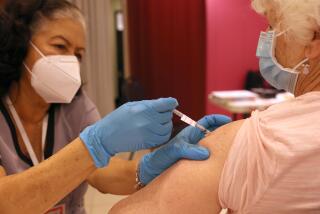AIDS Ruled Job-Related; Disability Pay Ordered
- Share via
A Los Angeles construction worker who acquired AIDS in Zaire has been awarded worker’s compensation payments by a California administrative law judge who ruled that his “occupational disease” was acquired through contact with prostitutes, a practice that was condoned by his employer, an American construction firm.
The decision is the first case in California in which AIDS was ruled a job-related injury, a Department of Industrial Relations spokesman said Wednesday. The ruling was handed down last week in Norwalk by Judge Maurice J. Carey of the state Workers’ Compensation Appeals Board.
Carey awarded the worker, Paul Trejo, a weekly disability payment of $197.12.
The judge cited several legal precedents for his decision, among them the so-called “commercial traveler” rule in which California state courts have held that injuries sustained in activities that mix business with pleasure are compensable if the arrangement is expressly or implicitly approved by the employer.
But Vern Nelson, a spokesman for the firm in dispute, Morrison Knudsen Co. of Boise, Ida., said that “in no way does the company condone or supply prostitutes to workers.” He said the company will appeal the case to the full Workers’ Compensation Appeals Board in San Francisco.
Trejo, 46, was a member of a 30-man construction crew that built roads and electrical towers in the remote jungles of Zaire between 1977 and 1980. Although AIDS at that time had not been identified as a disease, research since has indicated that a significant number of people in Zaire were already infected by the AIDS virus.
According to Carey’s opinion, Morrison Knudsen did not allow the families of its employees in Zaire to accompany them because of fighting that was taking place between government and rebel forces. In addition, the workers’ living conditions were primitive and recreational activities were scarce.
As a result, Carey noted, Trejo and some of the other men would give a nearby village chief gasoline or diesel fuel as payment for procuring prostitutes for them.
Trejo then used a company truck to pick up the women and took them to his company-provided trailer home. Company supervisors, according to Trejo’s testimony, were aware of these transactions. Carey noted in his opinion that the facts of the case were not in dispute.
Trejo said the supervisors sometimes would give him permission to give the village chief drums of helicopter oil as additional payment, fuel that the chief used for lighting.
In a telephone interview, Carey said he believes it is now the “moral and legal obligation” of Morrison Knudsen to notify the other men who worked in Zaire of the possibility that they too may have been exposed to the AIDS virus.
“I think they all should be notified to take blood tests immediately,” he said.
Trejo returned to the United States in August, 1980, and was not diagnosed as having AIDS until December, 1985. Between 1981 and 1984, he worked in Colombia on another jungle construction job, where he sustained a back injury.
According to his attorney, Alfred Marotta of Downey, Trejo was undergoing rehabilitation for his back injury when he became ill and was diagnosed with AIDs.
Carey said there was no evidence to indicate that Trejo was an intravenous drug user, homosexual, bisexual or hemophiliac or that he had received blood transfusions--all high-risk factors for being infected with the acquired immune deficiency syndrome virus.
Although Carey throughout his decision used the term AIDS to describe Trejo’s illness, Dr. Alvin Markovitz, a West Los Angeles physician who examined Trejo, said in an interview that his diagnosis was actually AIDS-related complex, or ARC, an earlier stage of AIDS that usually progresses to full-blown disease.
He said Trejo currently is undergoing treatment at County-USC Medical Center with ribavirin, an experimental drug that may be effective in slowing progression of ARC to AIDS.
More to Read
Sign up for Essential California
The most important California stories and recommendations in your inbox every morning.
You may occasionally receive promotional content from the Los Angeles Times.










